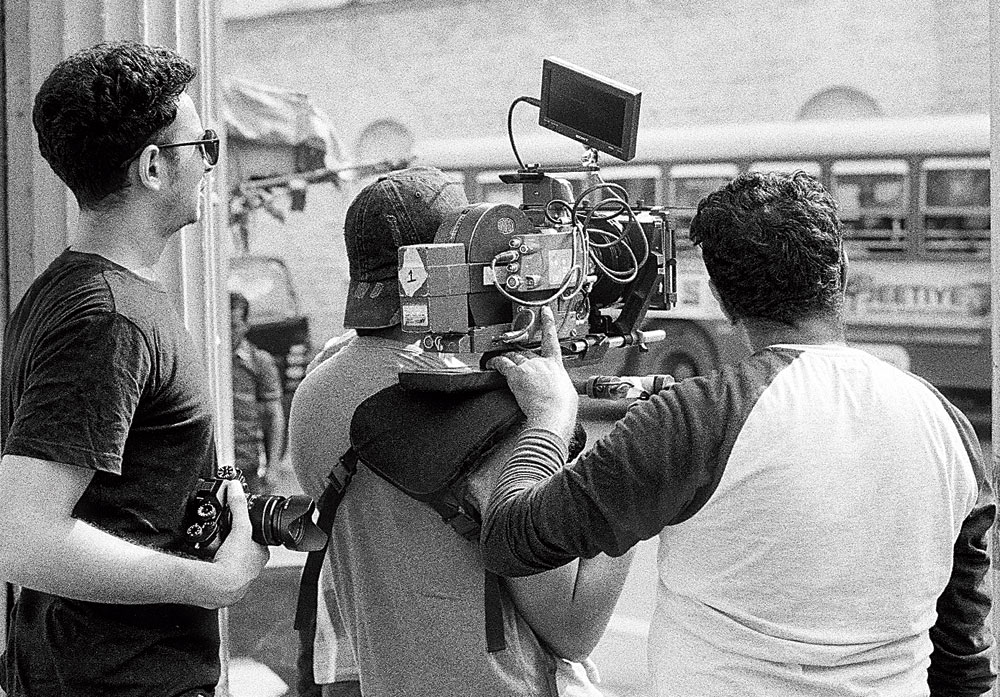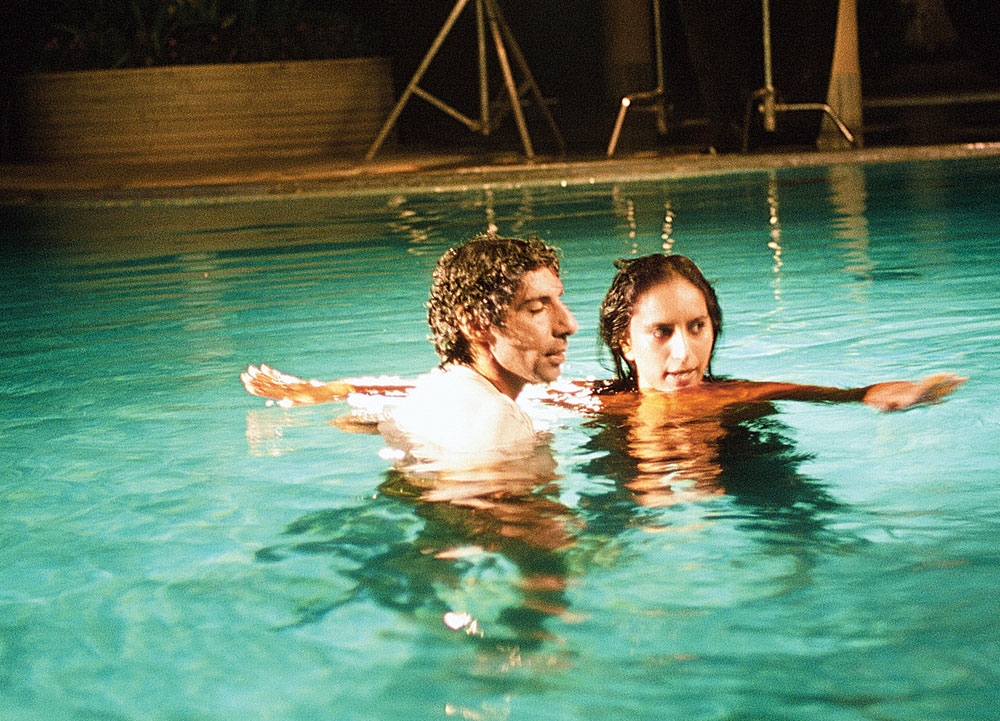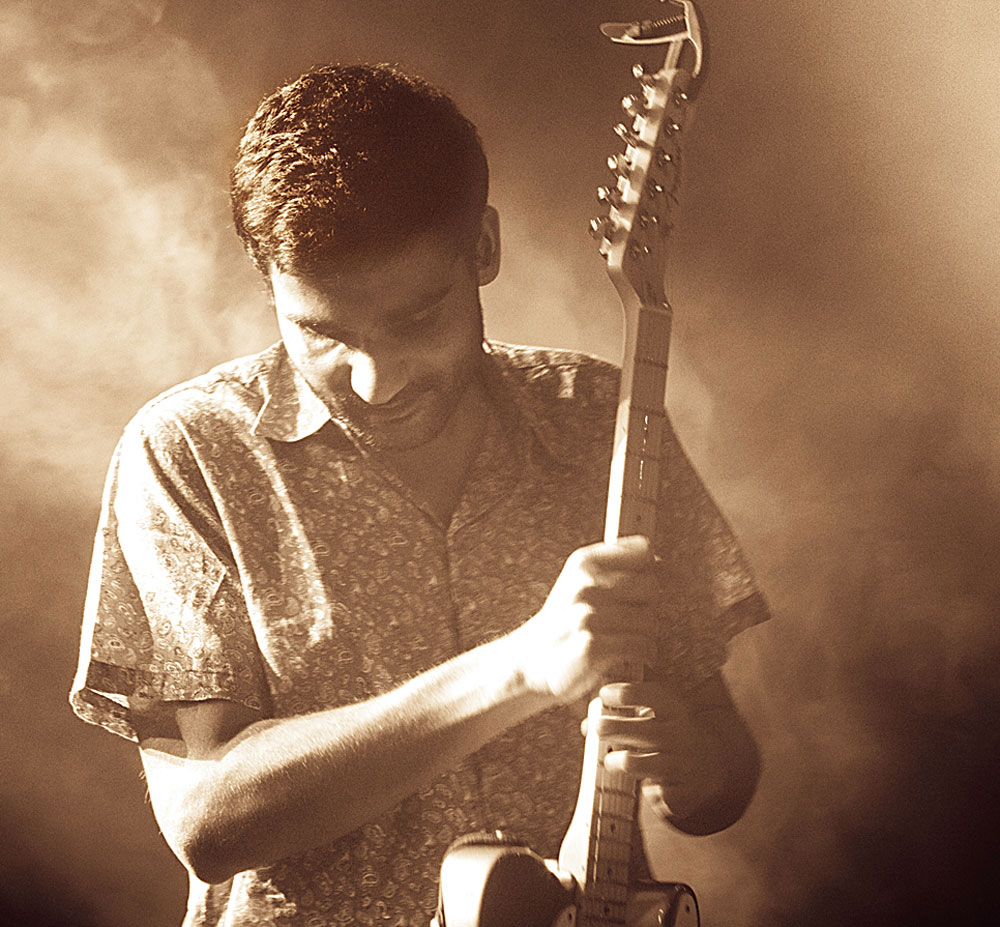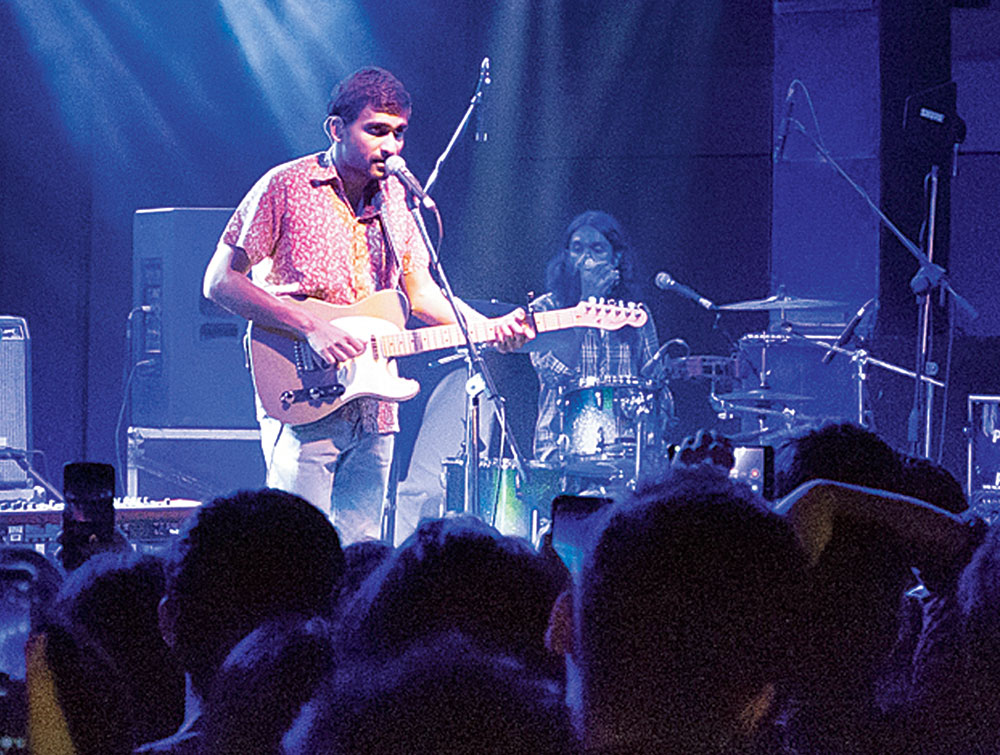
Behind-the-scenes images from the making of the video for cold/mess. Picture courtesy Prateek Kuhad
A s if Delhi-based singer-songwriter Prateek Kuhad hadn’t got us by our throats and sucked us into his world of ballads already — complete with serendipitous meetings, locking of eyes, the thrill of new love, lovers turning strangers et al. And then he goes and releases his cold/mess EP, followed by a video of the title track — a six-minute affair shot in filter, throbbing with the yearning and complexities of modern love, starring Jim Sarbh, Zoya Hussain and a lemon tart. All hell broke loose with strangers messaging him: “F**k you, Prateek!” — revelling and yearning in the heartache at the same time.
Behind what has perhaps become the biggest rage of the discernible music scene of the country since December 2018 is a 28-year-old bloke looking to write from his heart and make the world listen, the Bollywood shebang included.
When we caught up with Prateek on the sidelines of The India Story 4.0, we met an unassuming guy, happy to chat about his recent success and laughing about how hilarious he found the film Venom but also afflicted by the niggling worry of not doing enough and already looking ahead to what the future holds for him. Here’s taking a peek into the mind of Prateek Kuhad....

Jim Sarbh and Zoya Hussain shooting the video for cold/mess. Picture courtesy Prateek Kuhad

You can be indie or whatever but why would you not want anybody to listen to your music. I don’t get the “cool and underground” thing. Picture: Lensocrat
Cold/Mess Untangled
The video of cold/mess has captured the fancy of so many people. Whose idea was it?
I wanted to represent the record with the album artwork, which is also the same — two people kissing underwater. It was supposed to signify passion and love but suffocation at the same time — that kind of dichotomy — and that’s where it stemmed from. It’s just very real and I wrote the song — it comes from a very personal space and I have a lot of stories associated with that.
When we were working on the artwork, that’s how the imagery came up and that is very important for me. The video stemmed from that as well. I wanted to portray a really real toxic relationship and it’s very common actually, which I realised later because so many people told me it happened to them too.
The point was to not really show that there was one bad person in it — it wasn’t working for whatever reason and it is inexplicable why. The underwater imagery came with the artwork to metaphorically represent that.
I just gave this basic concept to Dar (Ukranian filmmaker Daria Gaikalova) and she basically wrote a script around it. It’s shot on 16mm film, which is why it has that texture, except the underwater stuff. I just got lucky with an amazing team — Dar, Dheer (producer Dheer Momaya) and Aditya (cinematographer Aditya Varma).
What was your involvement in it?
Just the initial concept note and the fact that I wanted to show a very real and basic relationship — two regular people living somewhere, having this issue and having the metaphorical aspect of the underwater stuff and then Dar basically wrote everything. I agreed with her point of view because she basically did what I had envisioned. Even the lemon tart has nothing to do with me. There are a few other personal recurring stuff that I am not sure where they came from, perhaps they are personal to her.
And you also appear in the video…
For a second and I was forced to do that! So when that scene was being shot at a nightclub in Lower Parel (Mumbai), I wasn’t there for the first half of the shoot that day. I was there during 85 per cent of the shoot in general because I just wanted to be around. And I think Jim (Sarbh) said: ‘You should be the guy to come and push me away.’ And then Dar and Aditya agreed.
But I was like: ‘I cannot act, I don’t know how to do this sh*t, it’s going to be awkward and I am going to look terrible.’ But then I was there and they really pushed me to do it, so I did it and I didn’t really think it would make it to the final edit because it was just one take for three seconds or so. When I saw the first cut, it was there and I was like: ‘Guys, are you sure about this? This thing looks freakin'’ awkward!’ But at the end of the day, it’s their creative call, frankly, with the video.
Obviously it’s collaborative in that sense — if either party really hated something, they would point it out. But there was no conflict at all and this was the only thing I wasn’t sure about and I never liked looking at myself. But then everyone I showed it to liked it, and then I just let it be.
Whose idea was the casting?
So Jim and Zoya (Hussain) are both good friends of Dar and Dheer and so they got them on board. They are also both incredible actors.
What’s the best response you’ve got for the video?
I mean there are so many. I remember I got a message from this girl saying that she saw the video and got back with her boyfriend. There were so many messages and comments. I haven’t been reading any more because if you look at my Instagram, there are like hundreds of really long, detailed messages in my inbox about how much they love Jim in it and how much they love the song, the video and how it has affected them and how they can’t stop crying. It affected some so intensely that I got a few messages saying, “F**k you, Prateek!” and “F**k you for making this sh*t” — it’s pretty cool! (Laughs) there are bad stuff as well with the trolling.
How was the experience of shooting the video, since you were around for most part of it?
You know we did one pool scene and that failed completely because this was all done on a fairly tight budget and we were trying to find the cheapest options possible. So the first pool we found was a really cheap pool, one hour away from Mumbai, and it ended up being a really shady area. We got late and we were going to shoot around midnight and it was shady. So we just had to pack up and leave because there were Zoya and Dar and it wasn’t safe for women.
We went there with the lights and the crew and we just had to pack up and leave. The entire video took us five days and we also got so much more footage than is shown in the video and almost everything was nice. There’s a whole 10-minute sequence we shot in a kitchen that did not make it at all, though it was so nice. Aditya is a genius for editing that thing.
What was your personal response to the video, beyond just being involved in its making?
By the time I saw the first cut, I was too detached because I had seen it being shot in front of me — the footage, the rushes — and I had already gone through all of the emotions when the record actually came out in August, when it really hit me for a while, though I didn’t see the rushes till November.
I have been living this whole process for the past nine months now, since we recorded it. So I have reconciled to it at this point. I mean, I had also watched the video obsessively because I was trying to find every tiny mistake and during the eighth or the 10th watch, I cried at some point. And I think it was more because I had been wanting to shoot a video like this for ages and every video I have shot so far has been nice — like the Tum jab paas video was really nice — but shooting on film really did it for me.
It just gives it this quality that is very unique and really good and not some half-a** DIY but really professional. You can achieve that with digital as well but this was that plus amazing performances by both the actors, amazing editing, cinematography, it was written well — everything was really good. I wanted it to be like a short film and it ended up being like that. This was the first time I saw a video and did not even share it with anybody for the longest time for any opinion. I was like: “This is great and I know it is. Don’t care what others say so when do we put it out?” And frankly, it did way better than what I expected it to. It reached 600,000 on YouTube in like a week!
From a New York University degree in economics and math to cold/mess....
This is a really silly story but I was failing at guitar in school when I was 14-15 because I had no discipline. My professor called me and said he would switch me to carpentry or something electrical and I freaked out as all my friends were in the guitar class. But then I started taking guitar tuitions outside of school to just pass the exam and then I got really into it and got decent at it in a few months. And when I could play it, I got obsessed with it and started teaching it to myself and ended up playing it a lot over the next two years for several hours a day, every day. I used to jam with my friends and was into metal, which is really fun to play — from a songwriter’s perspective, I don’t get it any more but from a guitarist’s perspective, I totally get it. Songwriting also happened around the same time when I was trying to write a little alongside but I sucked real bad. Towards the end of school, I wrote a couple of songs that were decent enough to make my friends hear and in college, I wrote one that I sent to my sister and friends and they sent it to more people. Suddenly, a lot of them were singing it.
So at NYU you were still not thinking of becoming a musician?
I was on the way to becoming an analyst at a bank or a consultant at a firm or something, which I did for six months after college and interned at a bunch of banks and stuff. Music was never a plan at all. I played a bunch of local shows in New York that nobody came for and a few in Delhi — all for fun. My life was going well in college and I used my free time for music. But then I was working this job where I got really frustrated and I hated it and was depressed. I got a termination notice and I was probably going to get fired anyway, so I quit. I came back to India in 2013 and gave music one year and put out Raat raazi in August that year and it did well. I got booked by a bunch of festivals and people started talking about me in the small indie scene, which was a little bit of an encouragement. That prompted me to make another record and I had written a bunch of songs and had an English album ready as well.
How has the journey been?
I still have days when I am like, “What the f**k am I doing?” I had that moment four days ago, in fact! I think it’s existential and I still sometimes think that I suck — I definitely did when I started out. If you listen to my older stuff, it’s horrible! Like Chahe ya na chahe and Voh from Raat raazi were terrible.
Now I am okay with calling myself a songwriter, so it’s confusing sometimes. It’s actually hard to say what was hard about my journey. I think it’s dealing with the ups and downs. For three months there’s silence and you’re on the verge of giving up and then suddenly something happens. I am lucky that I have a very supportive family and group of friends and they were always there for me and whenever I had those moments they would tell me to chill out. It’s an up-and-down cycle.
What’s your take on the “indie” tag?
I try to stay away from the indie tag and I don’t listen to much from India. Historically, “indie” comes from the time when there were just big record labels and then these people started making music independently and put it out to a tiny group of people. But now, I feel it’s more DIY than that. It’s like if you have limited resources, you are indie. If you’re signed with a big label, you’re not. Saavn supported me through the release of cold/mess and a fair amount of resources went into the production, so I don’t think I can call myself indie any more.
Sometimes I get messages like: “I wish nobody discovers you but me.” And I am like: “Don’t say that! This is my livelihood — I am going to go broke if that happens, so don’t say that!” (Laughs)
I remember meeting a digital marketing person to push In Tokens & Charms and he wanted to know if I wanted to push the album to only a limited number of people and keep it really exclusive, cool and underground. Why would I want to limit my audience? I want everybody to listen to it.
You can be indie or whatever but why would you not want anybody to listen to your music. I don’t get the “cool and underground” thing. I look at this as a profession; my job is to make music and I have no business to say who should or should not listen to it.
I try to stay true to the craft of songwriting, the process of production and stay as real. When it’s done, you push it out and try to focus on the business aspect of it because that’s also important. I think there’s this big divide between indie and Bollywood in the heads of some people but frankly, I feel this will become irrelevant in five-six years and the only thing that will matter is good music because the monopoly in distribution will be gone completely. As long as the project is something I can do justice to, I can make music for anybody.
What’s your songwriting process like?
I think all artistes rely on their personal experiences to do what they do. You can’t really help it as all of this happens at a subconscious level. That being said, I started writing because it was a way of catharsis. I would have a sh**ty couple of weeks and then a song would come out. When I get depressed, I sit at the piano and the guitar and play them.
You write in both Hindi and English. Was that premeditated?
It happened organically and I am pretty sure I think in both languages because I talk in Hindi a lot too. It’s a mental barrier that some people have. There are a few people who can speak Hindi perfectly but say they can’t write as well in the language. But how can you have the vocabulary and not be able to write? It has to be a mental barrier then, right? And growing up, we have consumed so much Hindi music, so how can you not know how to write or express in it? This should be something very normal, really.
Literally, the first song I ever wrote while in school was in Hindi, I remember. And after college, I was in a phase when I was watching and listening to a lot of beautiful old Hindi films and music from the ’50s and ’60s and that got me interested intensely. And when you consume something so intensely, it happens organically. I think it’s very cool that Raat raazi used to be my most popular song and now cold/mess has taken that place.
How did the piano happen?
That happened a couple of years ago — I always wanted to learn it but I just sucked at it. I am okay at it now and it took me years. After not being able to play for many years, I bought a cheap digital piano two years ago. Then I spent a lot of time at home and learnt one cover and then another and then it happened and in six months, I was okay at it. I make music on it too now. It’s not intimidating any more but I am yet to be as comfortable as I am with the guitar — I can close my eyes and play it. I play simple stuff but it’s very, very comfortable and almost an extension of me. With the piano, I still have to focus a little bit and be careful, especially when I am on stage and a little bit nervous.
Does playing the festival circuit and touring eat into your time to make music?
I don’t remember spending more than two weeks at a stretch in Delhi. Also, I grew up in Jaipur, where my mom still lives, so I keep going back. Travel is a part of life but I really wish it wasn’t. I don’t have to write songs but I push myself to write them because I think the more you write, the better you get at it. Maybe there’s an overkill to it but I haven’t yet reached that point of crazy.
At times, I have written two-three songs in a day and I want a month like that... where I write almost 100 songs and then just stop for a bit. Not travelling would help that but anything is really possible if you’re disciplined.
I could write on the go as I have my guitar everywhere. I have been feeling less inspired on the guitar lately. It has been the piano and every time I am back in Delhi where my piano is and I have set it up in a way that is right to me. That is why I like being in Delhi because that’s where I write a bunch. And then you’re away and it throws you off the zone that you’re in... of writing a little bit every day. Then you’re suddenly off for a week.
I have so many half-written songs, it’s not funny. I am first and foremost a songwriter and that is why I started doing all of this. It starts feeling pointless when I am spending a disproportionate amount of time touring. But at the same time, I understand that it’s practically very important and that’s where I make a lot of my money that sustains me. Live shows are special for sure as I can see the fans connecting, so I kinda have to do both, even if it’s not my ideal scenario.
I would like to do one long tour in India and then disappear and make my music. I write on the go but not as well or as much. There are no excuses and you should be able to write anywhere but right now, my comfort zone is writing at home in Delhi.
As an artiste, do you like having to use social media?
It’s conflicting. I do all my social media posts myself mostly. When I started off, it was Instagram and Facebook only. Instagram is my favourite thing because I like taking photos. These platforms definitely make it easier to reach and share — it’s kind of like digital word of mouth. It’s a curse and a blessing. But I hate how addictive likes and follower count are — I know it’s stupid and it’s annoying!
What about invasion of privacy?
I am not concerned about it (data privacy), I think. I mean if something has to happen, it will happen. If one day some evil corporation controls the world then whether or not you’re on social media, you are screwed. When it comes to fans, invasion is not okay because I get conscious when I am working and I am focused on something else. Like during a show, I am in game mode but during soundcheck, I am not.
What do you do to step away and unwind?
I don’t feel the need to because it does not get too much for me. Maybe because I don’t do too much of it. During cold/mess, we spent two months on just that and I loved it! I want to keep doing that. There are days when I am lazy and just on Netflix.
What can we look forward to from you?
Just shows mostly but I want to put out a record soon. I don’t want to rush into it and put out a bad one. I have to sit down and produce and make proper demos and that’s what I need a month in Delhi for. I just need a basic piano-drum-bass guitar track and I just mix it and make a demo and that’s when I get more perspective. When I am happy with the demo, I share it, get feedback, play it live and see how it goes and that process is yet to begin but I am hoping that it happens soon.











